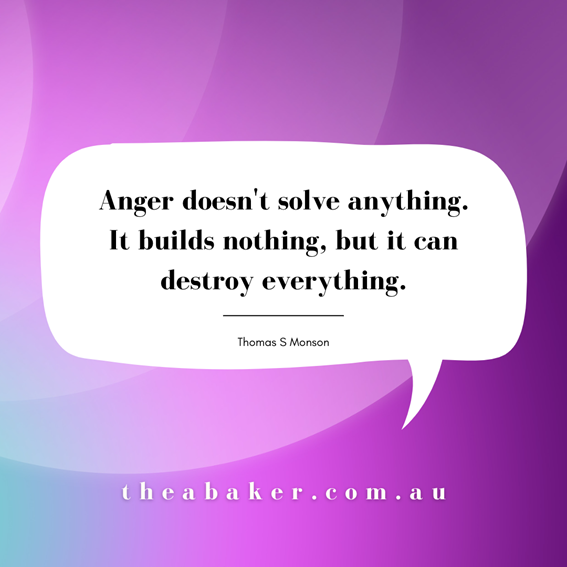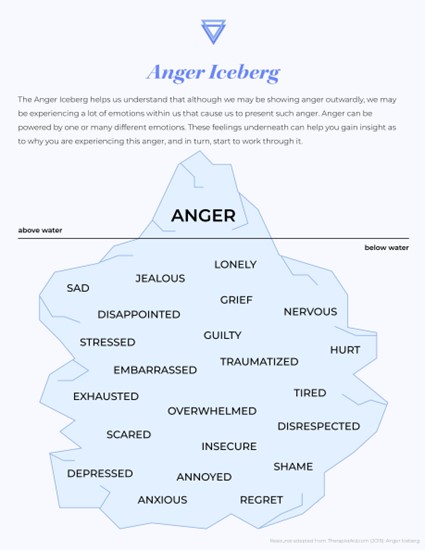The value of anger
The value of anger
As far as emotions go, anger gets a bad rap. There’s a lot of shame around acknowledging anger but there’s a big difference between feeling angry and acting from a place of anger. I’m not sure why but I’ve been absorbing a whole random bunch of media this week (from The Imperfects podcast to an episode of Grey’s Anatomy!) that have been themed around anger, so I’ve been doing a lot of thinking about one of the most fundamental of emotions that we wrangle with.

So first off anger (as defined by the American Psychological Association) is a “basic emption that arises from frustration, injustice, or injury. It can be caused by external triggers like interactions with other people, stressors like traffic or internal triggers like remembering past memories or painful events. From an evolutionary perspective it’s an integral part of our fight-flight response to trauma. This is what is happening to our brain when we get angry:
- Anger activates the amygdala (alarm system of the brain that is responsible for recognising danger or threat) which then activates the hypothalamus.
- The hypothalamus signals to the pituitary gland to trigger the release of stress hormones.
- The pituitary gland activates the adrenal glands, which releases those stress hormones like adrenaline and cortisol (the hormones needed to get the nervous system to do the fighting or the flighting).
- Stress hormones are then flowing through the entire body from heart to muscles to lungs.
When we are feeling angry and it’s not just in response to a direct and obvious threat there is usually something that is happening underneath – another deeper cause for that anger. This is where the anger iceberg comes in. The anger is pointing to something that is causing pain and it warrants attention, however one of the big challenges we face when navigating challenging emotions like anger is that we are moved to act – and fast! That’s the essence of that survival instinct where anger comes from in a physiological and evolutionary sense.

When anger isn’t coming from a threat-space, it can be the mask covering a multitude of very uncomfortable emotions that can come about when people don’t act or respond the way that we believe that they should. It can be the result of poor communication and misunderstandings. Anger often has its little tentacles in emotions like:
- Hurt
- Worry
- Disappointment
- Sadness
- Jealousy
- Stress
- Frustration
- Fear
Without spending another blog on how to create space for uncomfortable feelings to allow us time to choose how we are going to respond to them adaptively (see earlier blogs on this), let’s just note that when anger floods us, we need to become aware and attuned to its unique tell-tale effects in our nervous system. Anger will be triggered by, and bodily speaking, feels different for each of us. We need to get tuned in to what our personal triggers are, and what it feels like on the inside. Is it sweaty palms, clenched fists, tension in your stomach or chest? Can you hear your heart beating in your chest, loud and powerful? Or is your head pulsating with the sound of blood pounding in your ears?
When navigated well, anger can be channeled and utilised in quite productive ways:
- Anger motivates us to fix problems – it can propel is into action
- Anger can energise us – it can serve as a positive force to stand up for ourselves and creatively navigate obstacles
- Anger can drive us towards our goals – when triggered it can sometimes remind us that we have drifted off course, preventing us from realising our desired objectives
- Anger protects our core values – it can serve a value indicator and regulator, highlighting discrepancies and boundary infringements
- Anger makes us aware of injustice – it serves as an internal guidance that can indicate when things are not right, just or fair and can lead to big societal change
If you need to tend to what is underneath your anger right now, we have therapists at Thea Baker Wellbeing – please reach out to us at: hello@theabaker.com.au / 03 9077 8194.
